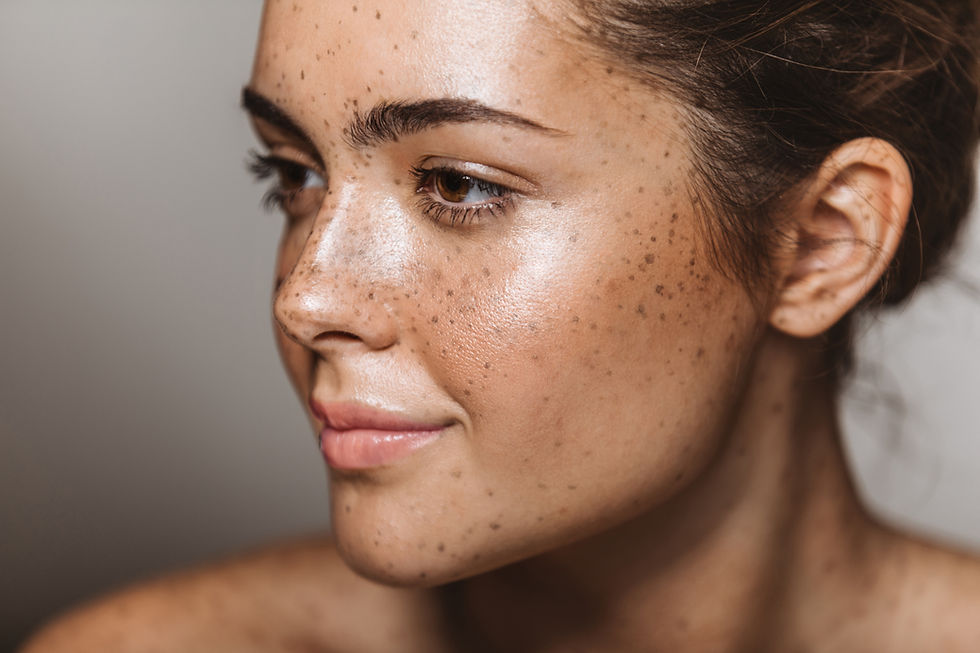Vitamin C - The Naked Truth
Q | What is vitamin C ?

A | Vitamin C, also known as (L)-ascorbic acid, is a water-soluble vitamin naturally occurring in fresh fruits and vegetables like orange, kiwi, red pepper and broccoli.
It has different names such as (L)-threoascorbic acid, antiscorbutic factor but in reality this refers to the same molecule.
Its name comes from the latin “scorbutus” as it protects from scurvy.
In the old days, pirates and long overseas sailors frequently suffered from scurvy because they could not eat fresh fruit and vegetables.
Vitamin C is indeed an essential nutrient which cannot be synthesized by humans and is mainly supplied by food.
Often associated with vitality and tonus, Vitamin C has important biological functions in the body such as the biosynthesis of collagen, required for tissue repair, or the activation of immune system. It is also a powerful anti-oxidant.
Q | Is vitamin C good for my skin?

A | From a chemistry point of view, Vitamin C is an anti-oxidant but what does it mean?
It actually refers to its capacity to neutralize harmful oxidants present in our environment.
The most abundant oxidant in the air is oxygen (20 %) responsible for iron rust or rancid butter. Ozone and free radicals are other powerful oxidants formed by air pollution (cars, fuel...).
It is now established that oxidation is a major cause of skin aging.
Not only does it alter the cell elasticity but it also affects the cellular division by damaging the DNA and the capacity of the skin to regenerate. Because it can block those mechanisms, Vitamin C has a beneficial effect on the skin.
The molecule itself is water-soluble and cannot penetrate the lipophilic layers found deeper in the skin. Therefore, this action in only superficial (epiderm) if it is used without carrier (liposome, microcapsule) for a topical application.
Added to a cream, the Vitamin C stays on the skin’s surface and offers a barrier against cell-damaging oxidative particles. It also regenerates the skin elasticity by stimulating the biosynthesis of collagen as well as new skin cells, restoring the skin’s natural glow.

Ideally, the cream should be used daily to maintain an efficient protection and stimulate the cells growth otherwise the benefits will be lost.
In addition, Vitamin C does not tackle severe aging signs such as deep wrinkles for which fillers are more suitable.
So start using it from a young age, it should be used as a preventative measure rather than a solution for already present wrinkles.
Q | Is it suitable for sensitive skin?

A | Vitamin C is classified as an acid as its full chemical name is (L)-ascorbic acid. Thus, it can be irritating for the skin if used improperly.
For example, a saturated aqueous solution at 176 mg per ml has a pH between 1 and 2.5 which is similar to vinegar!
If you make your own cosmetics, be extra cautious about the proportion of Vitamin C for avoiding redness.
A recommended level for skin cosmetics is between 3 and 10 %.
If you have sensitive skin, always test your preparation on a small skin surface such as the back of your hand.
Q | Can Vitamin C cause allergies?

A | Vitamin C is an essential nutrient for humans as our organism needs a daily intake to function optimally. For that reason, it is very well tolerated by the body so the risk of allergy is non-existent.
However, skin sensitization is still possible if the dosage is too high.
Funny kitchen chemistry experiment
If you want to see how vitamin C preserves from oxygen, just do this easy experiment
Cut an apple in half
Poor some orange juice on one side and save the other one.
Leave the apple exposed to the air for a day.
Compare the two sides of the apple. What do you conclude?

When you cut the apple, the enzymatic degradation breakdown will immediately start and lead to a brownish colour
However, because this requires oxygen, it will not occur if you add orange juice, rich in Vitamin C, which preserves the apple from the oxidation.
Thank you Dr. Vincent!!
Melanie Jane is collaborating with Dr. Vincent to educate everyone about Organic Chemistry and help you understand what is safe in your skin care or perfumes and stop all this scaremongering nonsense when it comes to chemicals, which occur in every single thing even water!

























